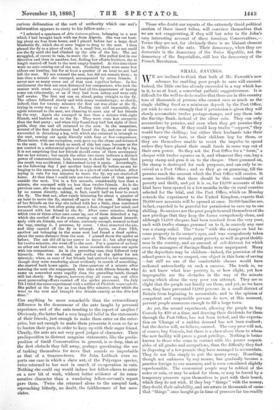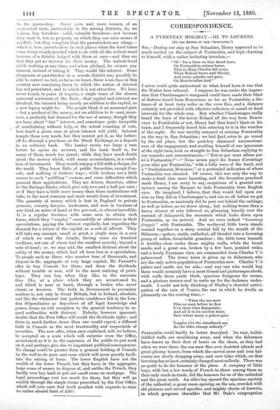SMALL SAVINGS.
WE are inclined to think that both of Mr. Pawcett's now schemes for enabling poor people to save will succeed.- Indeed, the little one has already succeeded in a way which has in it, to us at least, a somewhat pathetic suggestiveness. It is difficult for the well-to-do to realise that there are in this country tens of thousands of persons who cannot save so much as the single shilling fixed as a minimum deposit by the Post Office, yet wish to save so strongly that if permission is given they will slowly accumulate twelve postage-stamps, and pay them into the Savings Bank, instead of the silver coin. They can only accumulate by pennies, and even when they get pennies they cannot keep them. If they could keep twelve " copper's," they would have the shilling; but either their husbands take their coppers away for beer, or their children beg for them, or they are themselves unable to resist the impulse to spend unless they have placed their small funds in some way out of
their own power. So they ask the Post Office for a "form," a cheque with twelve squares on it, and whenever they can, buy a penny stamp and gum it on to the cheque. Once gummed on, the stamp is destroyed for cash purposes, and can only be re- ceived at a Post Office ; and so they go on gumming, till the pennies reach the amount which the Post Office will receive. It seems incredible that there should be this combination of poverty and thrift, and yet it is so, for 14,000 accounts of this kind have been opened in a few months in the six rural counties selected for the trial, and the Post Office, which on Monday extends the experiment to the United Kingdom, expects that 70,000 new accounts will be opened at once. 70,000 families are, infect, expected to be grateful for permission to save up to one shilling. So anxious are the poor people to avail themselves of the- new privilege that they keep the forms scrupulously clean, and although 14,000 cheques had been received from the very poor, each with twelve stamps gummed on to it, in scarcely any case was a stamp soiled. The " form " with the stamps on had be- come property in its owner's eyes, and was scrupulously taken care of. The story reveals great poverty as well as great thrifti- ness in the country, and an amount of self-distrust for which even the managers of Savings-Banks were unprepared. Many of the depositors may be children—indeed, the provision of the school-pence is, as we suspect, one object in this form of saving —but still no one of the comfortable classes would have reckoned antecedently on such a success. The truth is, we do not know what true poverty is, or how slight, yet how impregnable are the obstacles in the way of the minute saving which alone the very poor can attempt. They are so slight that the people can hardly see them, and yet, as we have seen, they have prevented 14,000 persons in a small district of Britain from beginning to accumulate, and in the opinion-of competent and responsible persons do now, at this moment, prevent people numerous enough to fill a large town.
As yet, the second experiment, allowing the people to buy Consols by £10 at a time, and drawing their dividends for them, through the Post Office, has not been tested, and the expectao tion on 'Change of a sudden demand has not been realised; but the device will, we believe, succeed. The very poor will not,. of course, buy Consols, but there is a class above them to whom. the new facility will prove a great privilege. Nothing is better known to those who come in contact with the poorer respect. ables of all grades and occupations, than the difficulty they find' in disposing of a few pounds they have managed to accumulate. They do not like simply to put the money away. Hoarding, though not unknown by any means, has gradually become a practice foreign to our manners, and is even considered slightly reprehensible. The economical people may be robbed of the notes or coin, or may be asked for them, or may be forced by a temporary pressure upon themselves to part with their hoard, which they do not wish. If they buy " things " with the money, they doubt their saleability, and are aware in thousands of cases that "things" once bought go in time of pressure far too readily
to the pawn-shop. Some men, and more women, of an economical turn, particularly in the mining districts, do, we believe, buy furniture—solid, valuable furniture—not because they want it, but as property on which they can raise money if needful ; but they complain that the pawnbrokers are stingy— which is true, pawnbrokers in such places when the hard times come being simply puzzled what to do with all the walnut-wood bureaus of a district lodged with them at once—and they see that they get no interest for their money. The walnut-wood yields nothing at any time, and when pledged, its owners pay interest, instead of taking it. They would like interest. Some clergyman or pawnbroker in a remote district may possibly be able to correct ns, but, so far as we know, there is no class in this country now remaining down to which the notion of interest has not penetrated, and to which it is not attractive. We have never found, in years of inquiry, a single trace of the almost universal sentiment of the East,—that capital and interest are identical, the interest being merely an addition to the capital, as -a new legacy might be. The people think it an unearned gain --but a product of the money, not an addition to it—and, more- over, a perfectly fair demand for the use of money, though they are hazy about " fair " interest, and sometimes quite incapable of ascertaining without help, or the actual counting of coin, how'much a given sum at given interest will yield. Interest tempts them very much, but they cannot get it, as the better- off do, through a purchase on the Stock Exchange or a deposit in an ordinary bank. Ths banker wants too large a sum before he opens an account, and the bank itself is, for many of them, much too grand ; while they have much doubt about the secrecy which, with many accumulators, is a condi- tion of investment. They would not pay a bill with a cheque, for the world. They know little of public Securities, except Con- sols, and nothing of brokers' ways ; while brokers are a little averse to such " peddling " custom, and raise difficultiei which prevent their applications. They are driven, therefore, either to the Savings-Banks, which give only two and a half per cent.; or if they have a little more money than those institutions will take, to the most common and most unsafe form of investment. The quantity of money which is lent in England to private persons, country lawyers, tradesmen, and men in business of any kind, on notes of hand at five per cent., is almost incredilge. It is a regular business with some men to obtain such loans, which they "employ " -successfully or otherwise in their speculations, paying the interest regularly, but regarding the demand for a return of the capital as a sort of affront. They will take any amount, small or great, a single man, in a case of which we read the details, having some six hundred creditors, not one of whom had the smallest security, beyond a note of hand ; or, we may add, the smallest distrust about the safety of the money, which had all been lost in a speculation. To people such as these, who number tens of thousands, and dispose in the aggregate of very large capital, Mr. Fawcett's offer to buy Consols for them, and draw the dividends without trouble or cost, will be the most enticing of privi- leges. They can buy when they like, in the amounts they like, at a place which they are accustomed to, and which is near at hand, through a broker who never cheats or deceives. The faith in Government in pecuniary matters is, not only in Great Britain, but in Ireland, absolute, and like the whimsical but pathetic confidence felt in the Lon- don Stipendiaries as depositors of all legal knowledge and power, forms an odd exception to the general tendency to re- gard authorities with distrust. Nobody, however ignorant, doubts that the Post Office will credit the dividends right ; and there is, much farther down than one would expect, a diffused faith in Consols as the most trustworthy and respectable of securities. 'The new offer, when once explained, will, we believe, be accepted on a scale which will surprise even the Office, accustomed as it is to the eagerness of the public to put work on it, and perhaps give rise to important political consequences. No change could be greater than a general holding of Consols by the well-to-do poor, and none which will more greatly facili- tate the raising of loans. The lower English have not the wealth of the lower French, but they have, in the aggregate, large sums of money to dispose of, and unlike the French, they hardly ever buy land or put out small sums on mortgage. The legal proceedings cost too much for them, but they will go readily through the simple forms prescribed by the Post Office, which will very soon find itself assailed with requests to raise its rather absurd limit of L30).



































 Previous page
Previous page